News Detail
10/18/2023

Perseverance. Sacrifice. Life experience.
These are just some of the traits that non-traditional and transfer students bring to SUNY Cortland. The university will celebrate both groups Monday, Oct. 23, to Friday, Oct. 27, with special events and campus community member features.
Dual non-traditional transfer students highlighted below include:
- Calvin “Clay” Barnett, an adolescence education: English major from Harlem, N.Y.
- Emily Fedrizzi, a criminology major from Genoa, N.Y.
- Melinda “Mindy” Gardner, a therapeutic recreation major from Cortland, N.Y.
- Michelle LaMorte, a graphic design and digital media major from Dryden, N.Y.
Additional faculty and staff spotlights call out advice from SUNY Cortland employees who transferred during their own college experience.
SUNY Cortland currently enrolls approximately 200 non-traditional students, a population that the university defines as undergraduate students who are 24 or older or, regardless of their age, have dependent children, work full-time, have military experience or have made a break in education at some point after high school.
“These students are so often role models for their fellow undergraduates as they balance additional responsibilities outside the classroom, like families and jobs,” said Marinda Souva, associate director for transition programs and the advisor for the university’s Non-Traditional Student Organization. “I always enjoy learning from their experiences and perspectives.”
This fall, about 480 transfer students started their SUNY Cortland journey, with more than 200 expected to join this spring.
“Transfer students are a priority at Cortland,” said Greg Diller ’07, coordinator of transition programs. “Making the decision to start over at a new school can be daunting. We strive to create a strong support system for these students and help guide them through their transition.”
The week will feature stories about successful non-traditional and transfer students, highlights on faculty and staff who experienced the transfer process, opportunities to recognize non-traditional and transfer students as well as workshops and other activities.
Schedule of events
- Scholarship 101
Monday, Oct. 23
2 to 3 p.m.
Old Main, Room B-17A
Learn about the many scholarship opportunities available for non-traditional and transfer students and how to make your application stand out.
- Pizza and Wings
Tuesday, Oct. 24
Noon to 1:30 p.m.
Non-Traditional Student Lounge (second floor of Cornish Hall)
Grab lunch, chat with other non-traditional students and learn about resources offered through Clear Path for Veterans. This event is sponsored by a grant from Cortland Auxiliary Services. - Transfer Tuesday Advising Prep
Tuesday, Oct. 24
3 to 4 p.m.
Memorial Library, Room A-111 (Advisement and Transition Conference Room)
Learn how to prepare for spring advising and registration. - Study Abroad 101: Transfer Edition
Wednesday, Oct. 25
3 to 5 p.m.
Old Main Colloquium
Learn more about study abroad opportunities that may appeal especially to transfer students. - Transfer Fall Festival
Wednesday, Oct. 25
4 to 6 p.m.
Corey Union Exhibition Lounge
Enjoy fall crafting fun for transfers and non-traditional students. This event is sponsored by Tau Sigma Honor Society, a national honor society specifically for transfer students.
- Planetarium Show **
Wednesday, Oct. 25
6:30 p.m.
Bowers Hall Planetarium
Non-traditional students and their families can enjoy a break from studying and watch the stars. - Take a Transfer Student for Donuts
Oct. 26
11 a.m. to 2 p.m.
Newmark Pavilion
Donuts and cider will be available for transfer and non-traditional students who are recognized by SUNY Cortland faculty and staff members. - Non-Traditional Students Organization Meeting
Thursday, Oct. 26
6:30 p.m.
Webex - Door Decorating Contest Winners Announced
Friday, Oct. 27
Tau Sigma Honor Society will award prizes to offices across who decorate their door following this year’s theme for National Transfer Student Week, “Full Steam Ahead.”
** Sign-up required prior to event.
Faculty and staff transfer spotlights
Matthew Madden
Associate Professor, Physical Education Department
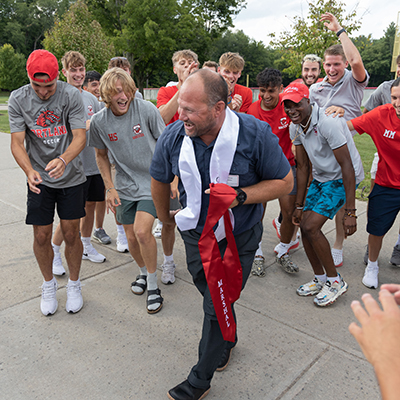
Transfer path: San Joaquin Delta Community College to California State University, Chico
Advice: “Get involved in some form of student activities beyond your coursework — student government, Greek life, academic clubs or club sports or intramurals.”
Krista Natale ’11
Technology Support Specialist in The Help Center
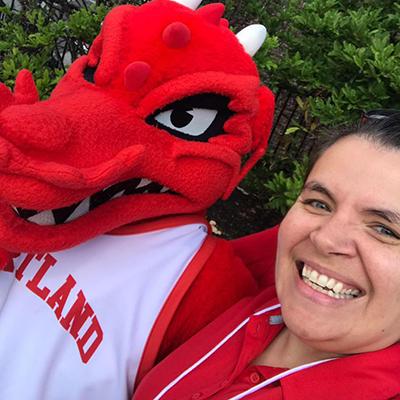
Transfer path: Tompkins Cortland Community College to SUNY Cortland
Advice: “Don’t be afraid to ask questions, even if it is in class or just in general. It is the best way to advocate for yourself. By doing so, you will make connections along the way that will be lifelong resources even after college.”
Justin Neretich ’17
Assistant Director for Operations, Residence Life and Housing Office
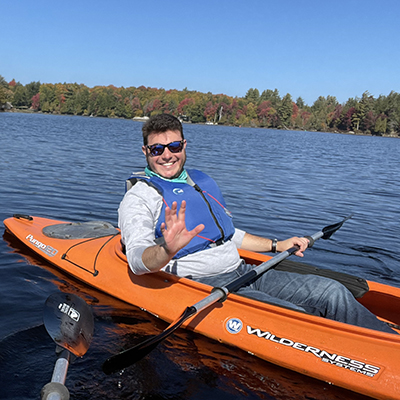
Transfer path: SUNY Purchase to SUNY Cortland
Advice: “I separated from my first institution knowing it wasn’t the right fit for me and had a better understanding of what I was looking for in my college experience by the time I transferred. Go find what you were looking for all along but were hesitant to do!”
Non-traditional transfer student spotlights
Calvin “Clay” Barnett
Adolescence Education: English
Harlem, N.Y.
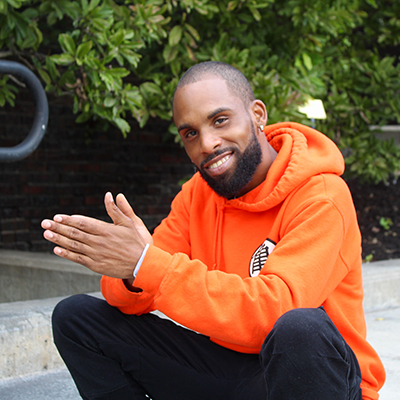
When he’s feeling stressed or anxious, Clay Barnett reminds himself that he’s already persevered to earn an associate degree. He’s committed to going even further.
“For a long time, I didn’t think I would amount to anything,” said Barnett, a non-traditional student who struggled to complete high school in New York City before he eventually enrolled at SUNY Sullivan in his late 20s. “Earning that degree gave me a sense of belonging.”
Now 31 years old, Barnett tries to motivate younger classmates and help them see that they belong at SUNY Cortland. He’s the director of diversity, equity and inclusion for the university’s Student Government Association as well as a resident assistant and a scholar in Cortland’s Urban Recruitment of Educators (C.U.R.E.) program. This February, he will lead activities for Abraham Lincoln DeMond 1889 Day, celebrating the university’s first Black graduate.
“Community is really important to me,” said Barnett, explaining that he has transformed since his high school days more than a decade ago.
He juggled jobs in the food service industry in New York City and Springfield, Mass., for several years, eventually working up to a manager’s role. But Barnett said he remembers feeling unsatisfied most days and wanting more for his life.
Multiple times, he fell just short on an entry test to SUNY Sullivan, a community college in Loch Sheldrake, N.Y., roughly two hours from Cortland. But after he eventually passed the exam, Barnett said a switch flipped and he committed to earning a college degree.
“I remember crying on the bus (to SUNY Sullivan),” he said. “I knew that my life was going to change forever.”
He succeeded at SUNY Sullivan and came to Cortland because of an Open House bus trip from New York City led by Khalia Banks ’13, a senior admissions advisor. Barnett found inspiration in Banks and her husband, Eric Banks ’13, M ’16, who he saw as an example of successful young alumni living and working near New York City.
In a similar way, Barnett aspires to teach after graduating and eventually become the dean of students at a high school who helps struggling students see their potential.
“I came to Cortland and I started to thrive,” he said. “I want to do that for other people.”
Emily Fedrizzi
Criminology
Genoa, N.Y.
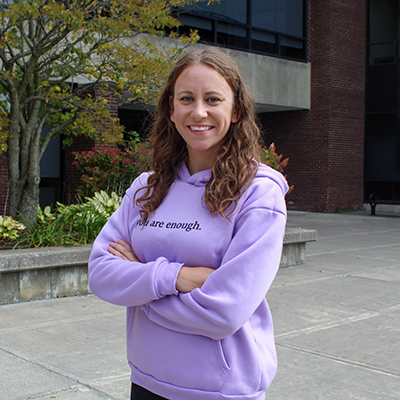
Emily Fedrizzi said she tends to look up to fellow non-traditional students in her classes because they’re often the ones setting a good example. A criminology major and 26-year-old veteran of the U.S. Air Force, Fedrizzi is proof herself.
“I think that non-traditional students add fieldwork and life experiences,” she said. “They’re very wise.”
Fedrizzi’s own military service reflects her personal commitment to education and her identity as a non-traditional student. After graduating from Southern Cayuga High School in 2015, she enrolled at Cayuga Community College and saw the benefits of enlisting in the U.S. Air Force.
“I wanted to further my education and that was a way to do it,” said Fedrizzi, who was stationed in Ramstein Air Base in Germany and served for four years from 2017 to 2021. “I loved it.”
In the Air Force, Fedrizzi was a member of Security Forces, which meant she was part of the military police working on flight lines to guard fighter jets and bomber planes. She traveled to 13 different countries, and the experience gave her practical experience tied to her academic interests.
Ultimately, the reputation of SUNY Cortland’s criminology major led Fedrizzi to enroll at the university in 2022. While many institutions may offer criminal justice, she explained the appeal of a criminology program.
“You’re thinking about what factors are playing into the criminal justice system, so it goes a little bit deeper here,” said Fedrizzi, a Dean’s List student who will graduate in May.
On campus, she serves as the vice president of SUNY Cortland’s Student Veterans and Military Club and recently joined the university’s new Fishing Club. After graduating, Fedrizzi plans to pursue a master’s in criminology through her G.I. Bill benefits and eventually hopes to earn a Ph.D. in the discipline.
She credits the university’s support for non-traditional students, especially from faculty members.
“Professors are not only knowledgeable but they’re willing to help if you need it,” she said. “They’re very empathetic, which isn’t the case everywhere.”
Melinda “Mindy” Gardner
Therapeutic Recreation
Cortland, N.Y.
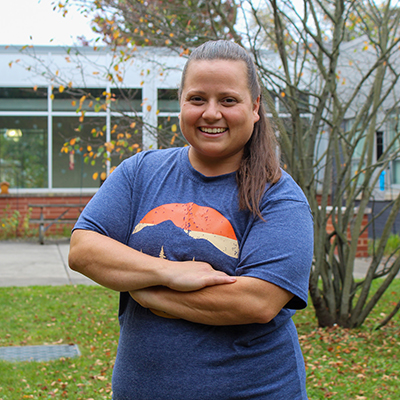
For her entire professional life, Mindy Gardner has worked to improve the lives of children and teenagers. She came to SUNY Cortland to earn a degree that will officially underscore the value of the hands-on experience she brings to the community.
Gardner balances her studies with working a full-time job and raising a young family of four — two commitments that some of the most dedicated non-traditional students juggle. A local Cortland resident, Gardner has built a meaningful career spanning 13-plus years at YWCA Cortland, first as a preschool teacher for eight years and now as a mentor director overseeing youth programming.
“I love my job and I want to elevate it to the next level,” said Gardner, 38, a therapeutic recreation major who also serves as president of the university’s Non-Traditional Student Organization. “Having SUNY Cortland in our backyard has allowed me to do that, using a lot of the things that I’ve learned in my current position.”
Gardner explained that she chose therapeutic recreation as a major because she wants to expand the possibilities for children, in the same way that others in the discipline work with the elderly or people with disabilities. Her current role at the YWCA includes hands-on group mentoring as well as lunch therapy in schools.
“I think working with youth is where I’m at my best,” Gardner said.
Originally from Poughkeepsie, N.Y., she began her studies after high school at Duchess Community College, but paused them after moving to the Binghamton area to care for her grandmother. Gardner and her husband settled in Cortland in 2010, and she eventually resumed coursework through a tuition exchange program between the YWCA and Tompkins Cortland Community College.
When Gardner found out she was close to earning an associate degree in human services, she decided to keep going for a bachelor’s that could provide career advancement. Despite having two young boys at home — now 7 and 4 years old — Gardner jumped in and now takes three classes each semester.
In addition to their life experience, Gardner mentioned non-traditional students bring an important element of collaboration to the classroom.
“When today’s students graduate from college, they’re going to be thrown into a workforce where they have to work with different people of different ages — not just their professor, not just their boss, but their co-workers,” she said. “And they might even be the supervisor of someone who’s older.
“So that aspect of learning how to collaborate and work with different age groups right off the bat can be a huge asset.”
Michelle LaMorte
Graphic Design and Digital Media
Dryden, N.Y.
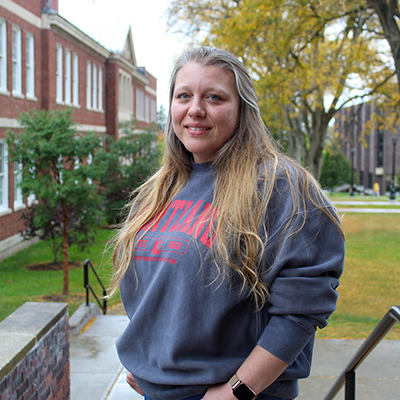
It’s easy to wonder when Michelle LaMorte finds time to sleep.
The mother of three takes a full-time schedule as a graphic design and digital media major. She serves as a teaching assistant in a multimedia course. She works at Tompkins Cortland Community College both as a professional tutor and lab manager. And she contributes her artistic talent to the Ithaca Times as a part-time photographer.
“I do a lot of different things,” said LaMorte, 43, who lives in Dryden.
That much has been true since long before she started her studies at SUNY Cortland. LaMorte grew up in Dryden and attended Tompkins Cortland Community College and SUNY Delhi in the late 1990s, at a time when course planning and degree progress wasn’t easily accessible online.
That led her to enlist in the U.S. Navy in 2000 and serve two years as an aviation support equipment technician, before starting a family. Over the next two decades, LaMorte and her husband would reside in both New York and North Carolina, raising three daughters — now ages 21, 18 and 12.
Her studies stayed on hold while she worked and cared for her family. But LaMorte’s husband faced several serious health complications that eventually forced her to reconsider her long-term career goals.
“I had already been thinking that I really wanted to go back to school,” LaMorte said. “I didn’t like working in factories, and I needed something more sustainable.”
In 2019, she resumed her studies at Tompkins Cortland Community College and earned her associate degree in 2021. Many nearby jobs in the graphic design field required a four-year degree or similar experience, so SUNY Cortland made sense.
“I wanted to be an example too,” said LaMorte, whose second daughter recently began her studies at Elmira College.
She is on track to earn her bachelor’s degree in May and has considered pursuing a master’s degree down the road. LaMorte said she has appreciated her Cortland experience because she feels like she belongs on campus, even if many of her classmates are younger in age.
“I think non-traditional students have life experience that they can lend to traditional-age students,” LaMorte said. “They’ve seen things and experienced things that they can share with others.”

